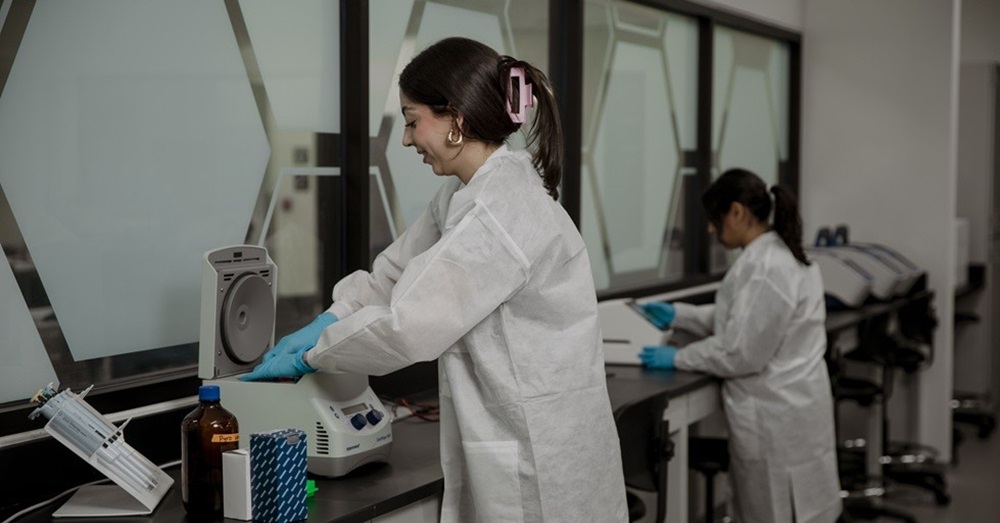Molecular Pathology Preceptorship: Unmatched Value and Experience

The Master of Science in Molecular Pathology program in the School of Health Professions is a one-year, lockstep master’s degree program, meaning students take all of the same classes every semester. Students start in the summer, then have a full fall semester. Following an eight-week spring semester, students typically leave Lubbock to experience a seven-week clinical preceptorship rotation.
We spoke with Ericka Hendrix, Ph.D., MB(ASCP)CM, Program Director and Associate Professor in the Master of Science in Molecular Pathology program in the School of Health Professions to learn more about the program’s preceptorship.
Hands-On, Networking Experience

Currently, the program has approximately 17 different affiliated laboratories – 11 in Texas and the rest outside of Texas. Hendrix shares that the program has partnerships with prestigious affiliates the Mayo Clinic in Minnesota, MD Anderson Cancer Center, Baylor Genetics and Scott and White in Texas, Tricor in New Mexico, Quest Nichols Institute in Virginia, Children’s Hospital in Colorado, and Nationwide Children's in Ohio. The program even offers a preceptorship in Lubbock called MicrogenDX.
“We tell the students, most of our affiliates hire our students and even if they don't go to that affiliate, another in their desired location typically would,” she says. “It's a really great networking tool for them.”
Placements
She says the program has a 100 percent job placement rate in the field. They encourage students to view the preceptorship as an interview, while it is the affiliates role to teach and assist in making sure students feel prepared for their post-graduation journeys. Hendrix calls it a win-win for both students and affiliates.
Hendrix notes that the program guarantees students a spot for a preceptorship somewhere, while other programs throughout the country require students to find spots for themselves. Instead, TTUHSC Master of Science in Molecular Pathology program takes on the work of securing affiliate locations for students, ensuring they will graduate on time – something Hendrix says is a huge value.
Affiliate Reviews
The affiliates do a professional evaluation on the students, so the students get feedback on whether they are meeting certain entry-level standards for the profession. Then, an employer survey is sent to affiliates and other labs that have actually employed the program’s students, asking how students are performing post-graduation.
On a feedback scale of one to five, the TTUHSC program has consistently scored between four and five in every category amongst affiliates and employers. According to Hendrix, when asked if affiliates would take more students, they would - gladly.
Student Testimonial
Former student, Erika Navarro, M.S., MB(ASCP)CM, currently works at Children’s Hospital in Denver, Colorado, where she had a great experience during her preceptorship. Navarro says it gave her the opportunity to apply her technical skills and molecular knowledge gained during the Molecular Pathology program in a real-world setting. She says she gained confidence in molecular diagnostics testing and hands-on experience with DNA and RNA extraction on various sample sources such as frozen tissue, FFPE, blood, bone marrow and many more. She was also able to observe NGS and Sanger sequencing and work with various molecular assays such as Factor II/V testing, STR chimerism analysis, and BCR IS residual disease monitoring in cancer patients.
“The experience really reinforced my interest in this field and prepared me well for my current role as a Molecular Technologist at the same place I completed my preceptorship,” she says. “Through my preceptorship, I was able to enter the role with a strong foundation on how the lab operates on a day to day basis.”
Today, Navarro has taken over the laboratory’s Sanger sequencing assay. At Children’s Hospital Colorado (CHCO), she says they provide free targeted known Sanger sequencing for family members of Children’s patients who have tested positive for pathogenic variants through our NGS testing. In the Molecular Pathology program, this was a topic the program touched on heavily – one Navarro also completed a research project on as well. She is in charge of designing primers for patients, ordering them through IDT DNA technologies, and completing the wet bench and analysis for patients. Through the Molecular Pathology program, Navarro says she was able to pass the MB(ASCP) certification exam and advance her career at CHCO.
Related Stories
Celebrating Veterans: TTUHSC’s General Martin Clay’s Legacy of Service and Leadership
From his initial enlistment in the Army National Guard 36 years ago to his leadership in military and civilian health care management roles, Major General Martin Clay’s career has been shaped by adaptability, mission focus and service to others.
Texas Tech University Health Sciences Center School of Nursing Named Best Accelerated Bachelor of Science in Nursing Program in Texas
The TTUHSC School of Nursing Accelerated Bachelor of Science in Nursing (BSN) program has been ranked the No. 1 accelerated nursing program in Texas by RegisteredNursing.org.
TTUHSC Names New Regional Dean for the School of Nursing
Louise Rice, DNP, RN, has been named regional dean of the TTUHSC School of Nursing on the Amarillo campus.
Recent Stories
The John Wayne Cancer Foundation Surgical Oncology Fellowship Program at Texas Tech University Health Sciences Center Announced
TTUHSC is collaborating with the John Wayne Cancer Foundation and has established the Big Cure Endowment, which supports the university’s efforts to reduce cancer incidence and increase survivability of people in rural and underserved areas.
TTUHSC Receives $1 Million Gift from Amarillo National Bank to Expand and Enhance Pediatric Care in the Panhandle
TTUHSC School of Medicine leaders accepted a $1 million philanthropic gift from Amarillo National Bank on Tuesday (Feb. 10), marking a transformational investment in pediatric care for the Texas Panhandle.
Texas Tech University Health Sciences Center Permian Basin Announces Pediatric Residency Program Gift
TTUHSC Permian Basin, along with the Permian Strategic Partnership and the Scharbauer Foundation, Feb. 5 announced a gift that will fund a new pediatric residency.
